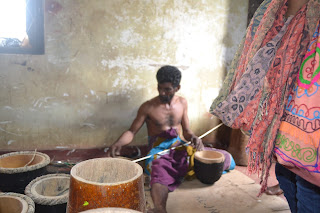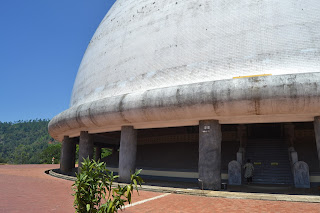Tuesday, October 31, 2023
Wednesday, November 18, 2020
Wednesday, July 15, 2020
Research Field Trip to Central Province - 2020
The Department of Musicology of the Faculty of Music of the University of the Visual and Performing Arts had a research field trip to the Central Province in February 2020. For three days, from the 17th to the 19th of February the undergraduate students in the 2nd and 3rd years and a number of academic and non-academic staff members of the Department participated in this field trip.
The following aims were identified to be achieved by the field trip.
- To inculcate and further develop a research culture within the students.
- To act as an opportunity for the undergraduates to explore and learn about the various fields of Musicology with a hands-on experience in the field.
- To promote the soft skills of the students such as communication, teamwork, delegation and sharing goals, and such necessary skills to engage in research activities in the future.
- To give grounds for undergraduates to explore culture and heritage through music and vice versa.
- Identifying and motivating undergraduates to engage and conduct researches based on fieldwork in the future.
The following images and descriptions showcase the importance of the locations visited on this field trip. The locations of the research field visit were selected based on the criteria for the subjects of Folklore Studies, the Evolution of Music, Research Methodology, and Organology offered by the Department of Musicology.
01. Agro Technology Park, Gannoruwa
Visiting the Agriculture museum to study the
equipment and methodologies used and applied traditionally. Visiting the Chena
cultivation and water tank to study the processes and activities behind these
sections in traditional agriculture. Visiting the sales and entrepreneurship
center to gain insights into how traditional agriculture can be implemented into
entrepreneurship studies.
One
of the main outcomes here was that the students were exposed to traditional
knowledge that is vital to folklore studies and was encouraged to explore this
sector more in the form of researches and studies.
02. Peradeniya Botanical Gardens, Peradeniya
Due to time constraints
it was decided to visit the Peradeniya
Botanical Gardens for an hour until the time was ready to proceed to the
location where lunch had been planned.
03. Kuragala Drum Community, Kuragala
Observing the methodology applied and used in traditional drum making. Studying the process of making a drum from the initial stages to the final product. Comparatively analyzing the traditional and modern methods in making drums. Obtaining data via informal interviews and participant observation.
An important outcome here was that the students
gained firsthand experience in conducting field research. Furthermore, they
were divided into groups and each group was provided with a different subtopic
as a foundation for further doable research.
04. Kotmale Reservoir, Kotmale
Observing the Kotmale reservoir leading to a
discussion on the water sources to the Kotmale reservoir.
An
important outcome of this was learning about the various advancements in
technology and the history of modern reservoir building in Sri Lanka. The very
intensive tour of the interior of the reservoir was well appreciated.
05. Mahaweli Maha Seya, Kotmale
Identifying the folklore related to the temple and observing the technological methods used in constructing the Seya.
This stupa was built as a symbol of the many
historic stupas and lands that were submerged due to the Mahaweli Development
Project. One of the largest stupas in Sri Lanka it was developed by the great
architect Dr. A.N.S. Kulasinghe.
06. Dehedu Kadulla, Kotmale
Learning about the historical significance and folktales surrounding this location.
According to
archeological sources this is a doorway into the area that the Sri Lankan
King, Dutugemunu hid his sword in while fleeing Southwards.
07. Niyamgamdora Raja Maha Viharaya, Kotmale
Observing the folklore related to the temple and
the Paththini Devalaya in the temple as well.
According to new legend, the Goddess Paththini had arrived in the dreams of
an elderly woman and instructed her to purify herself and find the Goddess’
ankle bracelet in a bush in the village and to build a place of worship over
it. Sources show the Devalaya to be
built-in the Kandyan era.
08. Pusulpitiya Raja Maha Viharaya, Kotmale
Studying the folklore and history surrounding
the location and the chronicles of King Dutugemunu.
Many sources cite the village of Pusulpitiya to
be a village where King Dutugemunu
spent his childhood in during the rule of King Elara. The Raja Maha Viharaya is said to be a location that the
Tooth relic of Lord Buddha was hidden in during times of political unrest in
the country. One of the four statues that Maha
Rahat Maliyadeva Thero brought from India is housed in
the temple decorated by an elaborate Makara
Thorana.
09. Niyamgampaya Raja Maha Viharaya, Gampola
Identifying and recording the archeological
evidence of the evolution of music and musical instruments as depicted through
the sources at the temple. Discussing the musicological traits and
characteristics present in the katayam
and vāmana rūpa in the temple.
Believed to be built around the period of 880 AD
as mentioned in literary sources, this temple once housed the Tooth relic of
Lord Buddha as mentioned in the Sinhala
Dalada Vamsaya. While literature indicates the temple to be glorious temple
housing a large number of monks throughout the centuries, in the modern day
most architectural sites are in ruins. A great stone doorway and a multitude of
carvings and pillars are of note in modern times.
The accommodations for lodging was provided by the Kotmale International Training Institute. Apart from the above, a night of musical enjoyment was shown by the participants of the trip. The research field visit concluded successfully on the 19th of February 2020, adding a new experience both academically and personally to all those who participated.
- Dr. Iranga Weerakkody
Senior Lecturer,
Department of Musicology,
Faculty of Music.
Sunday, June 28, 2020
Tuesday, January 7, 2020
Launch of the Inaugural Issue of the Folk Music Journal. ''Janashruthi Vimarshana''
The inaugural issue of the first folk music journal published
by the Department of Musicology of the Faculty of Music took place on Tuesday
the 17th of December from 3:00 pm onwards at the Dr. Ranjan
Abeysinghe Gamut in the premises of the Department of Musicology. Prof. Walter
Marasinghe, the former Vice-Chancellor of the University of Ruhuna, Prof.
Gamini Senanayake, competent authority Prof. W.M.A. Bandara, Prof. Saman
Chandra Ranasinghe, Dr. Praneeth Abeyesundara, Prof. Kolitha Bhanu Dissanayaka,
Prof. Kamal Waleboda, Dean of the Faculty of Music, Mr. Chiltas Dayawansha, the
Registrar, Mr. Dayawansha, Mr. Mahinda Kumara Dalupotha, Nishshanka Diddenniya
were among the prominent faces present at the proceedings that day. The
participation and support of the staff and students of the Department of
Musicology was appreciated greatly that day. The journal “Janashruthi Vimarshana” is expected to be issues annually. The
inaugural issue was edited by Dr. IrangaWeerakkody,
the Head of the Department of Musicology. A few moments from
that day are as follows.
Monday, December 9, 2019
The International Musicology Conference 2019
The International Musicology Conference which was held on the 7th of August 2019 commenced with a dash of colors as shown in the photographs. The event featured many speeches that showcased the importance and various aspects of musicology. The first keynote speech was made by Dr. Gamini Senanayake of the University of Ruhuna on the topic "Indigenous Knowledge and its Impact on Cultural Expressions in Sri Lanka". This was followed by the second keynote speaker Professor Kolitha Bhanu Dissanayake of the University of the Visual and Performing Arts who spoke on the topic "Perception of Musicology through Teleology: Novel Intellectual Outlook". The last keynote address of the day was by Professor Wasantha Priyadarshana who spoke about "Kalukumāra Syndrome (Culture-Specific Syndrome) A Critical Study with Reference to Sri Lankan Cultural Psychology".







































































